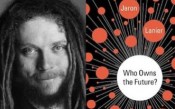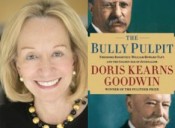Free Forum Q&A – RICHARD HEINBERG, Author of SNAKE OIL: Fracking’s Promise of Plenty Imperils Our Future
Written on December 3rd, 2013 |
Aired: 12/1/13
What do you know about hydraulic fracturing or “fracking” of natural gas?Probably depends on who you’re listening to. The fossil fuel industry tells you it’s the biggest energy development of the century, which promises America energy independence for the US and a huge boost to our economy with benefits to local economies. Many of the communities themselves tell a different story – of pollution on the one hand and social disruption on the other.
For the spoils of success, I recommend an article in March 2013 Harpers, Where Broken Hearts Stand, Grief and Recovery on the Badlands of North Dakota by Richard Manning.
RICHARD HEINBERG has a new book, SNAKE OIL: How Fracking’s Promise of Plenty Imperils Our Future, looks at fracking from both economic and environmental perspectives, informed by the most thorough analysis of shale gas and oil drilling data ever undertaken.
Join us as I try to find out, Is fracking the miracle cure-all to our energy ills, or a costly distraction from the necessary work of reducing our fossil fuel dependence?
Free Forum Q&A: JARON LANIER, Author of WHO OWNS THE FUTURE?
Written on November 26th, 2013 |
Aired: 11/24/13
After its recent IPO, Twitter is valued at nearly $25Billion. Now what is Twitter? Millions of tweets created and shared by users plus some ads. But how many users get a piece of that $25Billion? Well, none.
Where would Facebook be without Friends? What would Twitter, Amazon, Yelp, and any network whose value is based on our data, be without us – sharing photos and feelings, making purchases, registering opinions. More than programming or advertising, TV has always been about selling our eyeballs. Likewise, today’s online giants are selling our visits, our clicks, our shares.
JARON LANIER, in his new book, WHO OWNS THE FUTURE?, writes: “At the height of its power, Kodak employed more than 140,000 people and was worth $28 billion. They even invented the first digital camera. Today Kodak is bankrupt, and the new face of digital photography is Instagram. When Instagram was sold to Facebook for a billion dollars in 2012, it employed only 13 people. Where did all those jobs disappear? And what happened to the wealth that all those middle-class jobs created?”
He believes the emerging business model in which companies with relatively few employees profit off the participation of all of us, could doom any hope of a rebirth of the middle class. Lanier wants to solve a problem not many are talking about, and he envisions a radical solution — “a highly humanistic economy – one that will reward people for the valuable information they share with networks and the companies that control and profit from them.
Free Forum Q&A – DORIS KEARNS GOODWIN, Author of The Bully Pulpit Roosevelt vs Robber Barons
Written on November 19th, 2013 |
Aired: 11/17/13
The gap between rich and poor is huge and growing…legislative stalemate paralyzes the country…corporations fight federal regulations…the influence of money in politics is greater than ever…new inventions speed the pace of daily life.
Sound familiar? Those headlines from the early 1900s set the scene for Doris Kearns Goodwin’s new book The Bully Pulpit-a history of the first decade of the Progressive era – a time when courageous journalists and an ambitious president took on the Robber Barons – the 1% of their day – and won.
Goodwin tells the tale through the long friendship of Theodore Roosevelt and William Howard Taft – a relationship that serves both until it ruptures in 1912, when they engage in a brutal fight for the presidential nomination that cripples the progressive wing of the Republican Party and helps elect Woodrow Wilson.
Getting equal billing in her account is the golden age of journalism led by the muckraking press at McClure’s magazine. Together a bold and progressive press and a strong and progressive president served the people of the US rather than the super wealthy and the corporations. What lessons can we learn to help us turn this country around a century later?
Free Forum Q&A- Philip Caputo, Author of The Longest Road: Overland from Key West to the Arctic Ocean in Search of What Holds America Together
Written on September 24th, 2013 |
Aired: 09/22/13
Standing on an island off the Alaskan coast, PHILIP CAPUTO marveled that Inupiat Eskimo schoolchildren pledge allegiance to the same flag as the children of Cuban immigrants in Key West, six thousand miles away. And a question began to take shape: How does the United States, peopled by every race on earth, remain united?
CAPUTO resolved to drive from the nation’s southernmost point to the northernmost point reachable by road, talking to everyday Americans about their lives.
Fourteen years later, nearing 70, CAPUTO, his wife, and their two dogs drove a truck and an Airstream trailer from Key West, Florida, to Deadhorse, Alaska, covering 16,000 miles. They avoided interstates, and invited conversations with Americans you meet when you avoid interstates. Somewhere in many of those conversations, Caputo would ask two questions: What holds a country as vast and diverse as the United States together? Was it holding together as well as it once did?
Free Forum Q&A: APRIL RINNE Chief Strategy Officer, Collaborative Lab
Written on September 17th, 2013 |
Aired: 09/15/13
Are you doing more sharing these days? In a virtual sense, most of us would probably answer yes. Sharing political petitions, photos shot with our mobile phones, and of course, cute cat stuff. But what about sharing in the real world – are you doing more of that? Well, as a society the answer again is yes. Whether bike sharing, which is rolling out in 500 cities, car-sharing, even Hertz is getting into the game, or apartment sharing through services like AirB&B.
Habits and practices of simpler times like swapping, trading, renting, and sharing, have been reinvented through real-time technologies and peer-to-peer networks to make sharing more efficient and affordable than buying new things.
null
According to the Economist, “Occasional renting is cheaper than buying something outright or renting from a traditional provider such as a hotel or car-rental firm. The internet makes it cheaper and easier than ever to aggregate supply and demand. Smartphones with maps and satellite positioning can find a nearby room to rent or car to borrow. Online social networks and recommendation systems help establish trust; internet payment systems can handle the billing.”
Whether driven by economic hard times or technological innovation, something’s going on here and I’ll be talking about it for the next hour with April Rinne, Chief Strategy Officer of the Collaborative Lab.
www.cclab.
